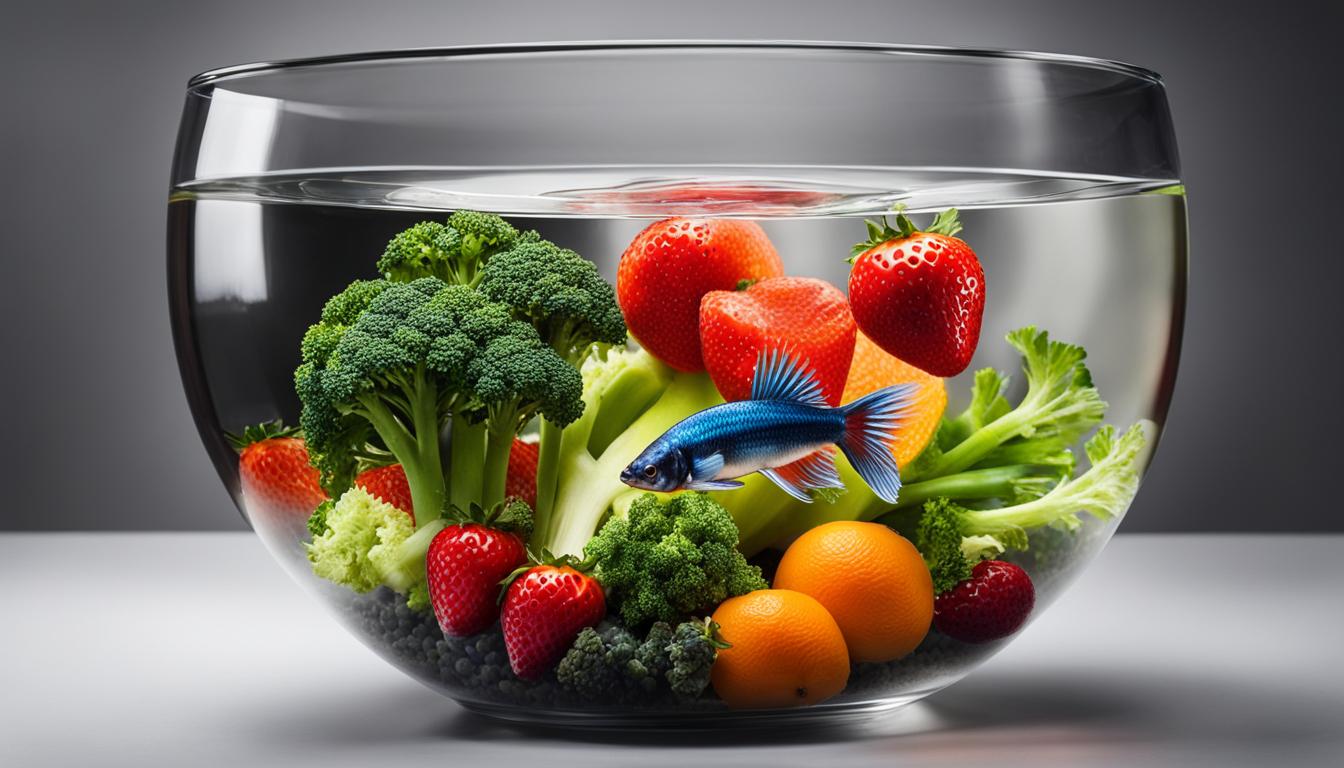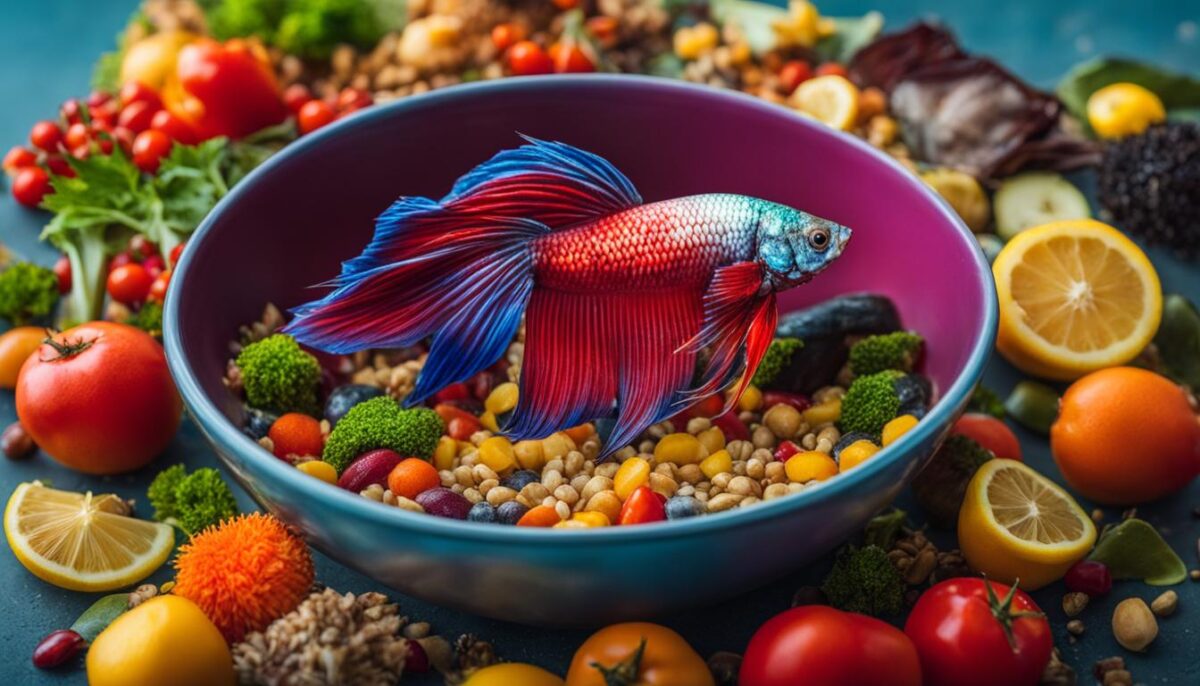Betta fish are fascinating creatures known for their vibrant colors and flowing fins. If you’re a betta fish owner, you may have wondered if it’s safe to share some of your own food with your finned friend. In this article, we’ll explore what human foods are safe for betta fish to consume and how to incorporate them into their diet.
Key Takeaways:
- Betta fish are primarily carnivorous and need a diet of small meaty creatures.
- Certain human foods can be safely fed to bettas as treats, including boiled peas, leafy greens, cucumber, and certain fruits.
- Avoid feeding bettas processed food, citrus fruits, chocolate, garlic, onion, and high-fat or high-sugar foods.
- It’s important to feed human foods in moderation and not replace the betta’s main diet.
- Establish a feeding schedule and avoid overfeeding to keep your betta fish healthy.
How Much Human Food to Feed to Betta Fish?
Betta fish are delicate creatures, and it’s important to feed them the right amount of human food to ensure their health and well-being. Overfeeding can lead to serious health issues, so it’s crucial to be mindful of their portion sizes.
Did you know that the size of a betta fish’s stomach is roughly the size of its eye? That’s why it’s recommended to feed them according to their small stomach size. A general rule of thumb is to offer a quarter of a pea or small pieces of other human foods mentioned earlier in the article: boiled peas, leafy greens, cucumber, sweet corn, non-citrus fruits, and seafood like raw shrimp, oysters, and scallops.
| Food | Portion Size |
|---|---|
| Boiled Peas | Quarter of a pea |
| Leafy Greens | Small pieces |
| Cucumber | Small slices |
| Sweet Corn | Small pieces |
| Non-citrus Fruits | Small slices or chunks |
| Seafood (e.g., raw shrimp, oysters, scallops) | Small pieces |
Remember, betta fish can survive up to 10 days without any food, so it’s better to underfeed them slightly than to overfeed. Establishing a fixed feeding schedule can also help promote optimal digestion and overall well-being for your bettas.
By feeding the right amount of human food to your betta fish and maintaining a balanced diet, you can ensure their health and happiness. Just remember to offer these foods as treats or supplements to their main diet and not as a replacement.
Customizing Betta’s Diet with Human Food
While betta fish primarily require a diet of meaty creatures, it is possible to add variety to their diet by incorporating certain human foods. However, it’s important to understand that these foods should not replace their main diet. Betta fish are obligate carnivores and need animal-based protein for their survival and well-being.
Feeding them human food should be treated as treats or supplements to their regular diet, rather than as a substitute. By offering occasional human food, you can customize your betta’s diet and provide them with additional nutrients.
It may take some time for bettas to get used to eating plant-based human food, but with consistent offering, they can develop a habit of consuming it occasionally. You can experiment with different types of human foods and observe your betta’s response to find out which ones they enjoy the most.
Remember, while it’s fun to customize your betta’s diet with human food, it’s crucial to prioritize their nutritional needs. Human food should not compromise their health or replace their main diet of meaty creatures. It should be offered as a supplement in moderation.
To further illustrate how you can customize your betta’s diet, take a look at the table below that showcases some safe and nutritious human foods for betta fish:
| Human Food | Description |
|---|---|
| Boiled Peas | A source of fiber and vitamins, but remove the skin before feeding. |
| Leafy Greens | Provides essential vitamins and minerals. Examples include spinach, lettuce, and kale. |
| Cucumber | High in water content and low in calories. Slice into small, bite-sized pieces. |
| Sweet Corn | A source of carbohydrates, but feed in moderation due to high starch content. |
| Non-citrus Fruits | Includes strawberries, apples, pear, melon, and cantaloupe. Provides vitamins and natural sugars. |
| Seafood | Raw shrimp, oysters, and scallops can be offered as a protein-rich treat. |
Remember to always observe your betta’s behavior and health when introducing new foods. If you notice any adverse reactions or digestive issues, it’s best to discontinue the particular food immediately. By customizing your betta’s diet with safe and nutritious human foods, you can enhance their diet and provide them with a well-rounded nutritional experience.
Conclusion
In conclusion, it is important to remember that while betta fish can enjoy certain human foods as occasional treats, their main diet should consist of their natural food – meaty creatures. Human food, such as boiled peas, leafy greens, and non-citrus fruits, can be offered to bettas in moderation, but should not replace their primary diet. Feeding them a balanced and varied diet is crucial to meet their nutritional needs and maintain their overall health and well-being.
It is also essential to avoid overfeeding betta fish, as it can lead to health issues. Their stomachs are small, so it is recommended to feed them according to the size of their eye. Offering a quarter of a pea or small pieces of other human foods mentioned earlier would be sufficient for one betta. Remember, bettas can survive up to 10 days without any food, so it’s better to slightly underfeed them than overfeed. Establishing a fixed feeding schedule can help ensure optimal digestion and prevent overfeeding.
While it is possible to customize a betta’s diet by incorporating certain human foods, it is important to understand that these should be treated as treats or supplements, not substitutes. Betta fish are obligate carnivores and require animal-based protein for their survival. Offering human food can provide dietary variety, but it should not replace their primary diet of meaty creatures. With consistent offering, bettas may develop a habit of consuming plant-based human food occasionally, enhancing their diet while still meeting their nutritional needs.
By understanding the right balance and types of human food to feed betta fish, you can provide them with an enriched diet while maintaining their health and well-being. Remember to prioritize their natural diet and avoid overfeeding. With proper care and a varied diet, your betta fish can thrive and live a happy and healthy life.
FAQ
Can betta fish eat human food?
Yes, betta fish can safely consume certain types of human food as occasional treats.
What human foods can be fed to betta fish?
Betta fish can eat boiled peas, leafy greens, cucumber, sweet corn, non-citrus fruits like strawberries, apples, pear, melon, and cantaloupe. Seafood like raw shrimp, oysters, and scallops can also be fed to bettas.
What human foods should be avoided when feeding betta fish?
It’s important to avoid processed food, citrus fruits, chocolate, bacon, dairy products, garlic, onion, bread, and high-fat or high-sugar foods when feeding betta fish.
How much human food should I feed to my betta fish?
The size of a betta fish’s stomach is roughly the size of its eye. It is recommended to feed them in moderation, such as a quarter of a pea or small pieces of other human foods, as treats.
Can betta fish survive without any food?
Yes, betta fish can survive up to 10 days without any food. It’s better to slightly underfeed them than to overfeed.
Can betta fish have an all-human food diet?
No, betta fish are obligate carnivores and need animal-based protein for their survival and well-being. Human food should be treated as supplements, not a substitute for their main diet.

